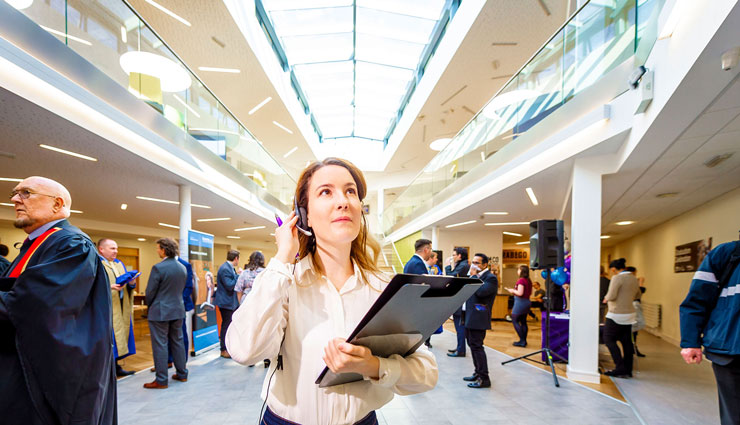You wake up, drink coffee and start your work. Things are going well until suddenly you hear a ding; A notification will appear on your mobile screen. It doesn’t matter what the information is; the important thing is that it’s completely distracting. How often does this happen to you? Everyday? Some many distractions and interruptions can seriously affect your performance at work. How to manage these distractions? You will read this article. Be with us.
What is work performed, and why is it important?
“Work performance” is a term that describes your ability to do your job. Managers can use different criteria to measure employee performance, the most common of which are:
- Speed;
- Quality;
- productivity
It is to have all these criteria, especially since work situations are different and different may be prioritized in each case. For example, an advertising company may value speed and quality to meet its customers’ expectations, while a construction company may aim for quality and efficiency.
Identify the criteria that are most important in your job. With this knowledge, you can work on improving your priority skills. Your manager will see your efforts and consider you a valuable asset to his team.
Don’t know where to start? Techniques that improve your work performance may be simpler than you think. In the following article, we will introduce these techniques. Browse through them to see which is best for you and your job.
How to improve work performance?
1. Limit distractions
Many people know this point but rarely follow it. Of course, this is not always possible. When you’re working, turn off your cell phone, turn off email notifications, close your office door, and focus on your work. You will be surprised by the results of these few seemingly useless actions.
Do you know that these short breaks cause employees to spend 27% more time doing something, make two times more mistakes, and be twice more anxious? Talking too much with coworkers, email notifications, checking social media, and surfing the Internet are some of the most common workplace distractions. Whether telecommuting or in-person, distractions can sabotage your efforts to improve performance. Avoid such distractions because these factors directly affect your productivity and concentration, leading to delays in completing tasks and projects.
2. Set clear and achievable goals
The goals you set must be realistic. You should set achievable goals after analyzing your abilities and limitations at work. We all want to be great, but we must also be mindful of our energy levels. If your goal does not match your strength and energy, you will be disappointed soon. Breaking big goals into smaller ones makes them easier to achieve.
Don’t dream when setting goals. Write them down on paper, so they are tangible. Rank your goals in order of importance. To achieve these goals, plan and stick to your project.
3. Use the right tool
86% of employees consider poor communication as the reason for failure at work. So the use of online collaboration software may play a decisive role in improving work performance. Now that remote work is more popular than before, most organizations use online collaboration tools to ease work processes and increase productivity. With the proper use of these tools, you can easily communicate with your colleagues and increase productivity.
4. Plan and prioritize

Planning and prioritizing work is the most critical measure to improve work performance when work tasks are compressed. Many people spend too much time doing low-priority or irrelevant tasks, leaving little time for urgent or high-priority tasks. This causes the completion of the work and the project delivery to be delayed.
Make a list of the things you need to do during the day. Do something urgent or a priority first and then do other things after they are done. Use techniques like the Pomodoro Technique to improve the quality of your work and time management.
5. Avoid multitasking
Multitasking may seem efficient, but switching between tasks decreases your efficiency. By doing several things simultaneously, your concentration drops, and you get tired quickly. List the things you need to do and prioritize them.
6. Manage time
Are you often rushing through a deadline? Do you take work home to avoid project delivery delays? If you answer yes to these two questions, you need to improve your time management skills to complete daily, weekly, and monthly tasks on time.
Time management is one skill that significantly impacts people’s work performance. Plan your working time. If the deadline is two weeks away, plan to do it now, and don’t put it off until the last day. One hour of focused work during the week is more effective than 3 hours of last-minute work.
According to research, procrastination is associated with increased stress, depression, anxiety, and fatigue. It may even lead to a decrease in job satisfaction and life satisfaction.
7. If possible, delegate your tasks to others
If you are a manager, it is natural that your duties are many. If possible, delegate some tasks to others and devote your time to doing more important things. Determine which tasks should be charged and which jobs require your expertise. Then identify the strengths of team members and delegate tasks based on them. Break large projects into smaller parts and give clear instructions to team members. In this way, things will go faster and better.
8. Do the challenging tasks first
Ever heard of the “swallow the frog” technique? According to this technique, when you want to do your work, you should do the most challenging and important thing first. Implementing this technique will help you to do more critical tasks on time and use the remaining time to do other jobs.
9. Organize your workspace
A cluttered table is one of the most critical factors of distraction. Arrange the things you need on the table regularly and collect the rest from the table. In addition to the physical space of the work environment, the busyness of the browser can also cause mental confusion. Close additional open tabs and windows.
10. Finish what you started
Another thing that affects your productivity and performance at work is not getting things done. Do you remember how often you started something and then gave up after a short time? If you do this most of the time, you must change this process. If you create a project or work, do not move on to another until it is finished.
- Set a time frame to do the work.
- Reward yourself for completing a task or project.
- Do the work at the time of day when you are most productive.
- Do not do anything else besides this.
11. Ask others for constructive feedback
A surefire way to improve work performance is to ask for constructive feedback from others. It would be best if you always were looking for ways to improve your performance at work, and asking for feedback from your manager is an excellent place to start. Even if you are the best at your job, you still have room for improvement.
12. Reduce your stress
How can you expect your work performance to improve when stressed? Indeed, a little bit of pressure is always part of the job, but you shouldn’t let it affect every aspect of your life. You can minimize stress by following some smart tips to achieve work-life balance.
- Identify situations that increase stress.
- In response to stress, do an activity such as exercise, meditation, yoga, or any other physical activity.
- Include short breaks in your daily schedule.
- Get help from friends and family members to manage stress.
13. stay healthy

You cannot improve your work performance if you are not physically and mentally healthy. A healthy lifestyle, such as exercise and healthy eating, has a surprising effect on improving work performance. Eating a hearty breakfast and walking for a few minutes will increase your concentration, energy, and motivation.
14. Communicate effectively
When you’re working on a big project, everyone on the team needs to know their responsibilities and how long they have to complete them. Effective communication leads to great teamwork; good teamwork also improves your collective performance and helps you finish the project in the best possible way.
15. Learn to say no
A sense of obligation to colleagues is a common scenario. They ask you to do part of their job, and you nod in agreement because you think saying no would make them uncomfortable. But do you notice that when you are doing other people’s tasks, you are using up the time meant for your work, reducing your efficiency and productivity? You should know that saying yes to everything is not always in your best interest.
16. take a rest
The body is not able to work for several hours in a row. Take a few minutes out of your day to take a short walk, stretch, and drink tea or other beverages. You can recover your energy and continue working in a better mood with a short rest.
17. Prioritize personal growth
We must evolve with the world around us. Learn new skills, read books, watch videos, and listen to podcasts promoting personal growth. Most likely, you will get helpful information that will be useful for your work.
18. Maintain work-life balance
All our life is not work; personal life is as important as work. After working hours, don’t think about work anymore. Spend time with your loved ones and do your favorite hobbies.
you say
What advice do you have to improve work performance? Please share your valuable comments and experiences with our dear users and us.



